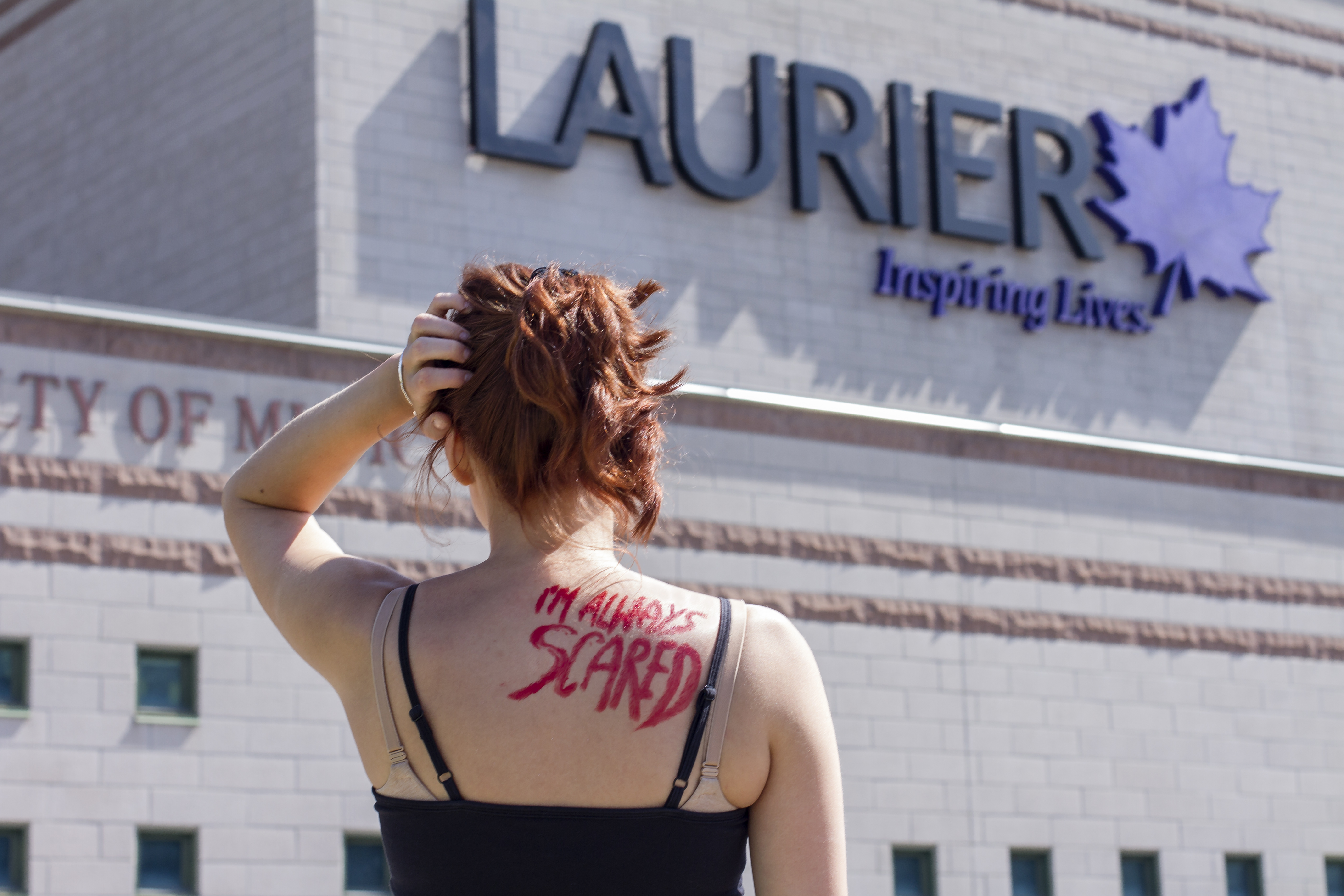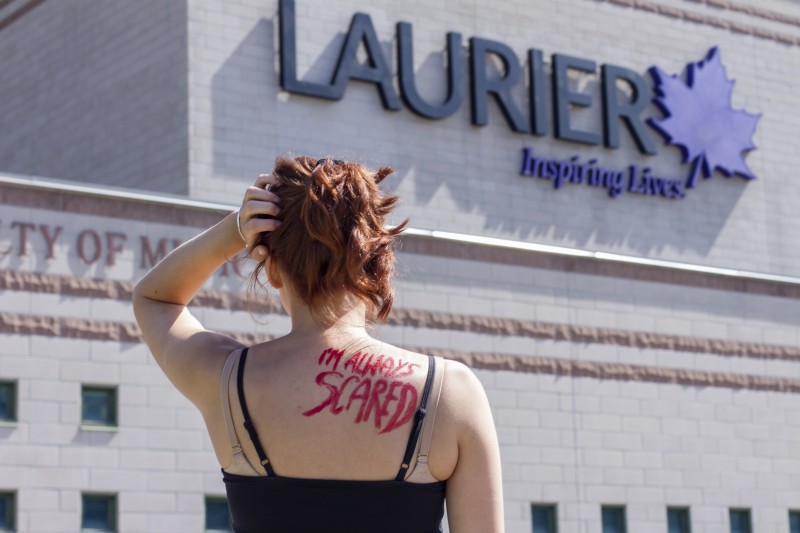Evaluating Laurier’s response to sexual assault

Community says change needed after university criticized for its handling of sexual assault case

On June 1, Waterloo’s regional newspaper, The Record, published an article after Justice Elliot Allen criticized Wilfrid Laurier University for their handling of a sexual assault case, allowing a student to continue his studies at the school while facing sexual assault allegations against a fellow female student.
The victim, who remains unidentified, found her perpetrator, Adam Hughes, in her dorm room the morning after a night of drinking in January 2013.
Hughes has been sentenced to 18 months behind bars and three years on probation.
“Wilfrid Laurier University was apparently more concerned with the welfare of Mr. Hughes than that of his victim,” the judge told the court.
On June 2, Laurier released a statement responding to the news report. The university said they “upheld conditions of the perpetrators release from police custody after he was charged, including that he have no contact with the survivor and he be removed from her residence.”
On June 4, Laurier published a second press release asserting that ongoing support was extended to the survivor of the sexual assault case.
“Every effort is made to be supportive and sensitive to the needs of the survivor while also considering the fundamental legal principle that an accused is presumed innocent until proven guilty,” the press release said.
According to the release, 28 months passed between the assault and the conviction of the perpetrator in court. During that time, Hughes continued to work on campus and finish his studies.
Helen Ramirez, a contract academic staff in women and gender studies, has been hearing stories of sexual assault on campus for years. According to a study done by the CBC in February 2015, Laurier reported 11 incidents of sexual assault from 2009 to 2013.
“We have risen all of our concerns with the administration over many, many years trying to get the administration more actively engaged in doing something, but also change is very slow,” said Ramirez.
Laurier’s dean of students, Leanne Holland Brown, said there are a series of steps once a student becomes a victim of violence. The school must review* Laurier’s non-academic code of conduct, which elaborates on what the process would look like once a student proceeds with a complaint.
“The first and most important step is to make sure that the victim or the survivor, depending on what kind of context you’re talking about, gets the immediate support that they need,” Brown said.
Brown explained the victim would get personal and academic support, as well as required services in or outside the university.
“[We] really focus our attention on what the survivor needs for personal success, academic success and overall wellness,” said Brown.
If the victim requests the perpetrator to be dealt with, Drew Piticco, student conduct administrator, will begin the code of conduct process based on all the information reviewed from both parties. Results differ and can include expulsion from the university.
The university can demand coordinated access to the school, such as restricted time to the library and classes, if both the victim and perpetrator remain on campus.
In her victim impact statement, the female victim explained there were a couple of encounters with her attacker on campus despite attempts to keep them apart while the case was ongoing.
“I never got anxious before this and now I do a lot,” the young woman wrote in a victim impact statement. “I’m always scared I will see him.”
“I think that in terms of university, we need to be … held accountable,” said Ramirez. “What the judge said was right that this student, after experiencing a rape, should not have had to walk the hallways and around campus wondering whether or not her safety once again was at risk and that this other person had the right to just carry on as per usual without any kind of accountability or responsibility directed by the university.”
The Wilfrid Laurier University Students’ Union has said they are committed to bringing more awareness to gendered violence. The Students’ Union joined the gendered violence steering committee, an idea that came out of the Gendered Violence Task Force.
“We have working groups on it surrounding policies, survivors rights, education, training, awareness and communication,” said Olivia Matthews, Student Union’s president, chief executive officer and student representative of the steering committee.
According to Matthews, the Students’ Union plans to train first-year students on sexual violence, awareness and consent during Orientation Week this fall.
“When we start with first-year students they’re going to learn that and they’re going to keep learning that we have a zero-tolerance policy for it.”
Along with Laura Bassett, vice-president of university affairs and Chris Hyde, director of policy, research and advocacy, Matthews appeared before the Select Committee on Sexual Violence from the Legislative Assembly of Ontario on May 20. The Union is currently advocating for Laurier to be one of the first universities in Ontario to release a direct policy around sexual assault and harassment, including a survivor’s rights section.
“Enough is enough — we’re ready to deal with this and we’re ready to be a part of the change with the university”, said Matthews.
Ginette Lafrenière, associate professor in the faculty of social work, believes there needs to be a shift in how students deal with sexual violence on campus.
“This is not going to happen in four days, it’s not going to happen because a judge said [Laurier] did a terrible job — this is going to take years and years of hard work before we actually have a change of cultural and organizational change within the context of our university,” said Lafrenière.
Andrea Gunraj, communications specialist of Toronto’s Metropolitan Action Committee on Violence Against Women and Children (METRAC), believes post-secondary campuses should review their own policies and practices and examine its benefits with students, staff and security systems. Gunraj said policies may be in place, but response lacks when it comes to actually dealing with sexual assault.
“This is a thing that a lot of the times may not be on campuses, they might have policies and practices but not training on what those policies and practices are and what somebody could do if they were assaulted and what everybody’s responsibilities are,” said Gunraj.
* By “review,” the sentence means to reference and follow the code of conduct Laurier has in place to deal with instances of sexual violence.


